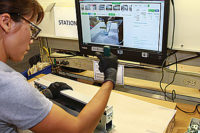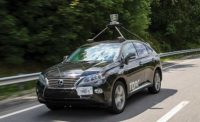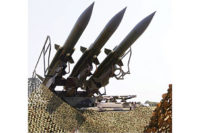Several years before Clearpath Robotics’ founders were named to Business Insider’s “People to Watch in 2015” list, Matthew Rendall, Ryan Gariepy and Bryan Webb were University of Waterloo mechatronics engineering students.
In April 2009, the three students entered the annual U.S. Army-sponsored Intelligent Ground Vehicle Competition with a low-cost robot that could detect and remove land-mines without risking human life. Although their robot finished dead last in the autonomous portion of the competition, traveling a distance of only 7 feet in 23 seconds, the team decided to form a robotics company later that year dedicated to automating the world’s dullest, dirtiest and deadliest jobs.
Calling itself Clearpath Robotics, the company maintained its focus on vehicles that could clear minefields. However, within two years, Clearpath introduced the robust Husky unmanned ground vehicle, with flexible payload capability, and the Kingfisher unmanned surface vessel (robot boat) that is often used for bathymetric surveys.
All assembly is done in-house, with the majority of parts sourced within Canada. Today, Clearpath is a multimillion dollar company and a leader in the field of unmanned vehicle robotics.
In early 2013, the company brought its electric Grizzly robotic utility vehicle to market. The vehicle weighs 2,000 pounds and is powered by 15 lead acid batteries. Also that year, Clearpath replaced its paper assembly instructions with cloud-based visual instruction software made by Visual Knowledge Share (VKS) Ltd. The software also collects critical productivity and quality data.
“Our paper instructions and checklists had become an overhead burden for our small company of about 15 full-time employees,” explains Jaron Lefler, production manager for Clearpath Robotics. “We weren’t excited about the burden of in-house server maintenance for a work instruction system. VKS was the clear choice for a system that would get us started quickly and scale with our business.”
The software benefits Clearpath assemblers in several ways. First, it ensures they always have the most recent version of assembly instructions. The software also reduces workspace clutter, the chance of errors in assembly instruction revisions, and overhead time when collecting data. For example, workers no longer need to create checklists and manually transcribe data into an electronic system.
“Now, if we decide to track a
critical piece of information, we simply add a small form to the assembly instructions,” notes Lefler. “Once we capture the data, it’s at our fingertips for later use.”
Clearpath’s latest unmanned vehicles are the Grizzly and Jackal. The Grizzly offers the performance of an all-terrain tractor with the precision of an industrial robot. It has a 600-kilogram maximum payload and an 80-hp motor. Designed in partnership with the Army Research Lab, the Jackal ground vehicle features a sturdy metal chassis, four durable wheels and skid-steer drive for maximum traction and durability.
VKS is a Chateauguay Machine Parts (CMP) company. CMP was founded in Montreal in 1969 and bought by Hans Zimmermann in 1972. Several years later, his son Steve took over the company, determined to find ways to increase plant productivity, reduce defects to zero and better train workers.
This focus led to the formation of VKS and its software. The software’s ToolConnect technology links with machines and tools so work instructions automatically advance as each step is performed.
For more information on visual work instructions, call 855-201-4656 or visit www.vksapp.com.





